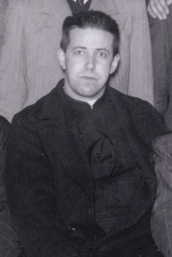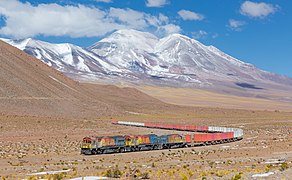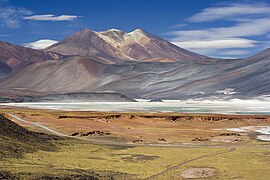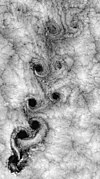Portal:Chile
| Main page | Assessment | Articles | Templates | Translation | Noticeboard | To Do List | Portal |
The Chile Portal

Chile, officially the Republic of Chile, is a country in western South America. It is the southernmost country in the world and the closest to Antarctica, stretching along a narrow strip of land between the Andes Mountains and the Pacific Ocean. With an area of 756,102 square kilometers (291,933 sq mi) and a population of 17.5 million as of 2017, Chile shares borders with Peru to the north, Bolivia to the northeast, Argentina to the east, and the Drake Passage to the south. The country also controls several Pacific islands, including Juan Fernández, Isla Salas y Gómez, Desventuradas, and Easter Island, and claims about 1,250,000 square kilometers (480,000 sq mi) of Antarctica as the Chilean Antarctic Territory. The capital and largest city of Chile is Santiago, and the national language is Spanish.
Spain conquered and colonized the region in the mid-16th century, replacing Inca rule, but failed to conquer the independent Mapuche people who inhabited what is now south-central Chile. Chile emerged as a relatively stable authoritarian republic in the 1830s after their 1818 declaration of independence from Spain. During the 19th century, Chile experienced significant economic and territorial growth, putting an end to Mapuche resistance in the 1880s and gaining its current northern territory in the War of the Pacific (1879–83) by defeating Peru and Bolivia. In the 20th century, up until the 1970s, Chile underwent a process of democratization and experienced rapid population growth and urbanization, while relying increasingly on exports from copper mining to support its economy. During the 1960s and 1970s, the country was marked by severe left-right political polarization and turmoil, which culminated in the 1973 Chilean coup d'état that overthrew Salvador Allende's democratically elected left-wing government. This was followed by a 16-year right-wing military dictatorship under Augusto Pinochet, which resulted in more than 3,000 deaths or disappearances. The regime ended in 1990, following a referendum in 1988, and was succeeded by a center-left coalition, which ruled until 2010.
Chile has a high-income economy and is one of the most economically and socially stable nations in South America, leading Latin America in competitiveness, per capita income, globalization, peace, and economic freedom. Chile also performs well in the region in terms of sustainability of the state and democratic development, and boasts the second lowest homicide rate in the Americas, following only Canada. Chile is a founding member of the United Nations, the Community of Latin American and Caribbean States (CELAC), and the Pacific Alliance, and joined the OECD in 2010. (Full article...)
La Pacana is a Miocene age caldera in northern Chile's Antofagasta Region. Part of the Central Volcanic Zone of the Andes, it is part of the Altiplano-Puna volcanic complex, a major caldera and silicic ignimbrite volcanic field. This volcanic field is located in remote regions at the Zapaleri tripoint between Chile, Bolivia and Argentina.
La Pacana along with other regional volcanoes was formed by the subduction of the Nazca Plate beneath the South American Plate in the Peru-Chile Trench. La Pacana is situated in a basement formed by various Paleozoic formations and Tertiary ignimbrites and volcanoes. Several major faults cross the region at La Pacana and have influenced its volcanic activity. (Full article...)Selected biography -
Selected article -
The Bueno River (Spanish: Río Bueno) is a river in southern Chile. It originates in Ranco Lake and like most of Chile rivers it drains into the Pacific Ocean at the southern boundary of the Valdivian Coastal Reserve. Its lower flow forms the border between Osorno Province and Ranco Province. Traditionally it marks also the northern boundary of the indigenous Huilliche territory known as Futahuillimapu. The river passes through Río Bueno commune and city that takes name from the river.
The major tributaries of the Bueno River are the Pilmaiquén River and the Rahue River, joining the river from the south. The former is the outlet of Puyehue Lake and the latter is the outlet of Rupanco Lake. (Full article...)General images
Did you know (auto generated)

- ... that Salar de Pajonales in Chile has been used as an analogue for environments on Mars?
- ... that Angelito de Canal 13, the mascot of the Chilean television network Canal 13, was inspired by its creator's son?
- ... that the Peruvian Civil Guard officer Mariano Santos Mateo was nicknamed the Brave Man of Tarapacá because he captured a banner of a Chilean military unit during the Battle of Tarapacá?
- ... that the Chile Ridge has a slab window?
- ... that Salar de Pedernales in Chile features dark slope streaks resembling dark slope streaks on Mars?
- ... that Daniela Ceballos worked with the Football Federation of Chile to supervise safety protocols during the COVID-19 pandemic while playing football herself?
Topics
Categories
Recognized content
| This is a list of recognized content, updated weekly by JL-Bot (talk · contribs) (typically on Saturdays). There is no need to edit the list yourself. If an article is missing from the list, make sure it is tagged (e.g. {{WikiProject Chile}}) or categorized correctly and wait for the next update. See WP:RECOG for configuration options. |
Featured articles
- Chilean battleship Almirante Latorre
- Almirante Latorre-class battleship
- Cerro Azul (Chile volcano)
- Calabozos
- El Tatio
- Chilean cruiser Esmeralda (1883)
- Guallatiri
- Laguna del Maule (volcano)
- Mothers of the Disappeared
- Ojos del Salado
- Pali-Aike volcanic field
- Pisco sour
- South American dreadnought race
- Taapaca
Good articles
- 2010 Pichilemu earthquakes
- 2018 Santiago ePrix
- Agustín Ross Cultural Centre
- Angata
- Los Ángeles Negros
- Apacheta-Aguilucho volcanic complex
- Argentine–Chilean naval arms race
- Atamu Tekena
- Orlando Bosch
- Lorenza Böttner
- Sara Braun
- Monte Burney
- Battle of Caldera Bay
- Felipe Camiroaga
- Chilean battleship Capitán Prat
- Carménère
- José María Caro Martínez
- Chile at the 2014 Winter Paralympics
- Coat of arms of Pichilemu
- Dutch expedition to Valdivia
- El Laco
- Milton Friedman
- Fueguino
- Mount Hudson
- Irruputuncu
- Laguna Miscanti
- Laguna del Negro Francisco
- Lascar (volcano)
- Lastarria
- Lazufre
- Licancabur
- Licancabur Lake
- Llullaillaco
- Nevado de Longaví
- Manuel Foster Observatory
- Monturaqui
- Irene Morales
- John Thomas North
- Obligation to Negotiate Access to the Pacific Ocean
- Olca-Paruma
- USS Oneota (1864)
- La Pacana
- Parinacota (volcano)
- Patio 29
- Pichilemu
- Colegio de la Preciosa Sangre de Pichilemu
- Salar de Punta Negra
- Reclus (volcano)
- Murders of María José Reyes and Juan Duarte
- Sammis Reyes
- Riro Kāinga
- Sairecabur
- Salar Ignorado
- San Pedro (Chile volcano)
- Socompa
- Sollipulli
- Tacora
- Tilocálar
- Nevado Tres Cruces
- Tupungatito
- Tuyajto Lake
Featured pictures
-
360-degree Panorama of the Southern Sky edit
-
A 360 degree panorama of a unique cloudscape over La Silla
-
Culpeo MC
-
FCAB EMD GT22CU-3 San Pedro - Ascotan
-
Laguna Miñiques, Chile, 2016-02-08, DD 33-38 PAN
-
Laser Towards Milky Ways Centre
-
Miscanti Lagoon near San Pedro de Atacama Chile Luca Galuzzi 2006
-
Moai Rano raraku
-
SQM GE 289A Boxcab Carmelita - Reverso
-
Volcán San Pedro, Chile, 2016-02-09, DD 18
-
Vortex-street-1
WikiProjects
Related portals
New articles
Rules | Match log | Results page (for watching) | Last updated: 2024-05-15 19:51 (UTC)
Note: The list display can now be customized by each user. See List display personalization for details.
- Caroline Dawson (writer) (edit | talk | history | links | watch | logs | tools) by Bearcat (talk · contribs · new pages (100)) started on 2024-05-15, score: 35
- Carlos Díaz León (edit | talk | history | links | watch | logs | tools) by Tommy Boy (talk · contribs · new pages (1)) started on 2024-05-14, score: 43
- List of international trips made by Winston Peters as Minister of Foreign Affairs of New Zealand (edit | talk | history | links | watch | logs | tools) by DougDommadome (talk · contribs · new pages (1)) started on 2024-05-04, score: 14
- Astronomical Observatory University of Warsaw (edit | talk | history | links | watch | logs | tools) by Rpoleski (talk · contribs · new pages (1)) started on 2024-05-03, score: 16
- Juan Carlos Bertone (edit | talk | history | links | watch | logs | tools) by ImSnot (talk · contribs · new pages (8)) started on 2024-05-14, score: 31
- List of P1Harmony live performances (edit | talk | history | links | watch | logs | tools) by Takpods (talk · contribs · new pages (1)) started on 2024-05-14, score: 14
- Lissette García Bustamante (edit | talk | history | links | watch | logs | tools) by Old-AgedKid (talk · contribs · new pages (1)) started on 2024-05-13, score: 43
- Gastón Stang (edit | talk | history | links | watch | logs | tools) by Das osmnezz (talk · contribs · new pages (59)) started on 2024-05-13, score: 24
- Víctor Fuentes (Chilean footballer) (edit | talk | history | links | watch | logs | tools) by BrazilianDude70 (talk · contribs · new pages (37)) started on 2024-05-13, score: 63
- John Budinich (edit | talk | history | links | watch | logs | tools) by EssNS (talk · contribs · new pages (15)) started on 2024-05-12, score: 37
- Refinado Tom (edit | talk | history | links | watch | logs | tools) by TabbyLadrona (talk · contribs · new pages (9)) started on 2024-05-12, score: 16
- Juan Martínez Gutiérrez (edit | talk | history | links | watch | logs | tools) by TomasVial (talk · contribs · new pages (2)) started on 2024-05-12, score: 43
- Tomás Lerman (edit | talk | history | links | watch | logs | tools) by ImSnot (talk · contribs · new pages (8)) started on 2024-05-12, score: 35
- Pedro Areso (edit | talk | history | links | watch | logs | tools) by Barr Theo (talk · contribs · new pages (56)) started on 2024-05-11, score: 28
- 2024 Copa América squads (edit | talk | history | links | watch | logs | tools) by Thiago89 (talk · contribs · new pages (10)) started on 2024-05-08, score: 14
- José Brunetti, 15th Duke of Arcos (edit | talk | history | links | watch | logs | tools) by DACC23 (talk · contribs · new pages (32)) started on 2024-05-10, score: 16
- Damián De Hoyos (edit | talk | history | links | watch | logs | tools) by ImSnot (talk · contribs · new pages (8)) started on 2024-05-10, score: 35
- Cristian Muga (edit | talk | history | links | watch | logs | tools) by ImSnot (talk · contribs · new pages (8)) started on 2024-05-10, score: 35
- Aguairenda (edit | talk | history | links | watch | logs | tools) by TulsaPoliticsFan (talk · contribs · new pages (13)) started on 2024-05-10, score: 18
- Marisola (edit | talk | history | links | watch | logs | tools) by Sebaspikyaq (talk · contribs · new pages (3)) started on 2024-05-10, score: 31
- Wolf (horse) (edit | talk | history | links | watch | logs | tools) by TabbyLadrona (talk · contribs · new pages (9)) started on 2024-05-09, score: 49
- Juan Parrochia (edit | talk | history | links | watch | logs | tools) by TomasVial (talk · contribs · new pages (2)) started on 2024-05-09, score: 55
- Gahona (edit | talk | history | links | watch | logs | tools) by Masohpotato (talk · contribs · new pages (4)) started on 2024-05-08, score: 30
- Jürgen Stock (astronomer) (edit | talk | history | links | watch | logs | tools) by Wuerzele (talk · contribs · new pages (1)) started on 2024-05-08, score: 22
- Daniel Michalski (runner) (edit | talk | history | links | watch | logs | tools) by Seacactus 13 (talk · contribs · new pages (13)) started on 2024-05-08, score: 20
- Bby Boo (edit | talk | history | links | watch | logs | tools) by 222 Goshiy (talk · contribs · new pages (3)) started on 2024-05-08, score: 20
- D' La Santa (edit | talk | history | links | watch | logs | tools) by Another Believer (talk · contribs · new pages (91)) started on 2024-05-08, score: 16
- Papelon (edit | talk | history | links | watch | logs | tools) by TabbyLadrona (talk · contribs · new pages (9)) started on 2024-05-08, score: 49
- South American Women's Basketball League (edit | talk | history | links | watch | logs | tools) by Marcetw (talk · contribs · new pages (5)) started on 2024-05-07, score: 14
- Estela López García (edit | talk | history | links | watch | logs | tools) by Depressingpoems (talk · contribs · new pages (1)) started on 2024-05-07, score: 29
- Steffan Pino (edit | talk | history | links | watch | logs | tools) by ImSnot (talk · contribs · new pages (8)) started on 2024-05-06, score: 87
- Cris MJ (edit | talk | history | links | watch | logs | tools) by Floppykart (talk · contribs · new pages (32)) started on 2024-05-06, score: 43
- 2017 South American Badminton Championships (edit | talk | history | links | watch | logs | tools) by Fanminton (talk · contribs · new pages (11)) started on 2024-05-05, score: 22
- Grace Konrad (edit | talk | history | links | watch | logs | tools) by MelonSeeeds (talk · contribs · new pages (2)) started on 2024-05-05, score: 14
- List of international trips made by Winston Peters as Foreign Minister (edit | talk | history | links | watch | logs | tools) by DougDommadome (talk · contribs · new pages (1)) started on 2024-05-04, score: 14
- Litfiba 3 (edit | talk | history | links | watch | logs | tools) by 82.84.225.97 (talk · contribs · new pages (9)) started on 2024-05-04, score: 40
- Wilfredo Ferrer (edit | talk | history | links | watch | logs | tools) by Pietaster (talk · contribs · new pages (18)) started on 2024-05-04, score: 14
- Manuel Balmaceda (athlete) (edit | talk | history | links | watch | logs | tools) by Pietaster (talk · contribs · new pages (18)) started on 2024-05-03, score: 31
- 2024 Copa Libertadores de Futsal (edit | talk | history | links | watch | logs | tools) by Thiago89 (talk · contribs · new pages (10)) started on 2024-05-02, score: 14
- 2016 South American Badminton Championships (edit | talk | history | links | watch | logs | tools) by Fanminton (talk · contribs · new pages (11)) started on 2024-05-02, score: 16
- Club Sport Colonial (edit | talk | history | links | watch | logs | tools) by Marcetw (talk · contribs · new pages (5)) started on 2024-05-02, score: 14
- Gusana (flatworm) (edit | talk | history | links | watch | logs | tools) by Plantdrew (talk · contribs · new pages (147)) started on 2024-05-02, score: 16
- Joseph Amerlinck (edit | talk | history | links | watch | logs | tools) by Andreas Philopater (talk · contribs · new pages (10)) started on 2024-05-02, score: 14
- Gabriel Palma (edit | talk | history | links | watch | logs | tools) by Msrasnw (talk · contribs · new pages (8)) started on 2024-05-01, score: 43
- Secretos de familia (Chilean TV series) (edit | talk | history | links | watch | logs | tools) by FrederickEvans (talk · contribs · new pages (66)) started on 2024-05-01, score: 31
- Deception Island incident (edit | talk | history | links | watch | logs | tools) by Bob meade (talk · contribs · new pages (0)) started on 2024-04-30, score: 16
Associated Wikimedia
The following Wikimedia Foundation sister projects provide more on this subject:
-
Commons
Free media repository -
Wikibooks
Free textbooks and manuals -
Wikidata
Free knowledge base -
Wikinews
Free-content news -
Wikiquote
Collection of quotations -
Wikisource
Free-content library -
Wikiversity
Free learning tools -
Wikivoyage
Free travel guide -
Wiktionary
Dictionary and thesaurus
























































